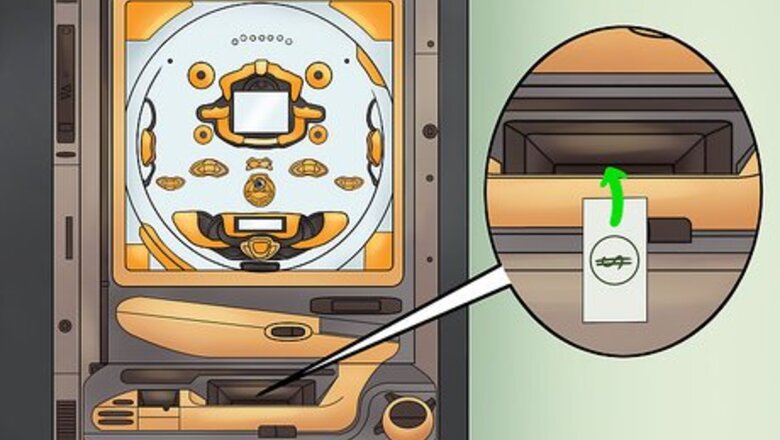
views
Playing Pachinko
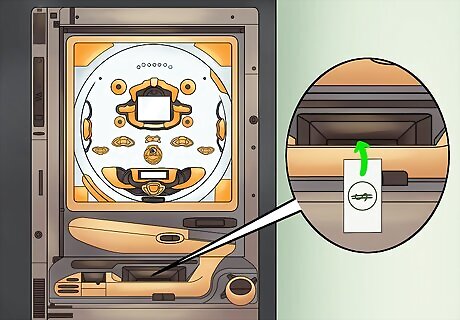
Put your money in the machine. Insert cash or a prepaid card into the pachinko machine. The cash will buy you a certain number of balls, which should be listed on the machine. You will buy a certain number of balls at a selected monetary values for the game. If playing an offline game, put money into the money slot on the ball dispenser that you find on the machine’s left-hand side. Think of the balls like a casino's chips. They stand in for real money, just not money you can collect at the parlor.
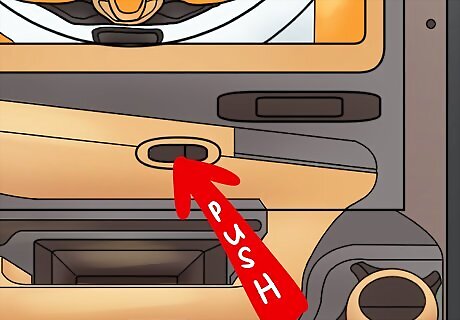
Press the ball-release button. The ball-release button is called the tamakashi button. When you press the button the balls will fall into the tray at the top of your machine. This tray is called the uwazara. Those are the balls you have to play with, which are technically "borrowed" from the parlor. If the balls don't come out or it doesn't seem like what you paid for, you can ask an attendant to help you.
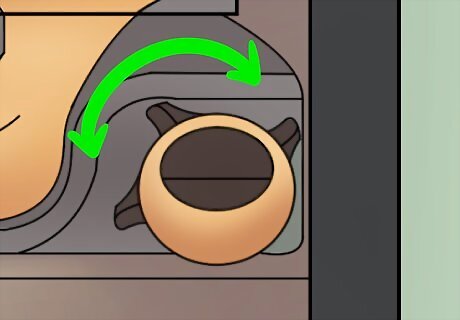
Turn the handle. You start playing in pachinko by pulling the handle that is on the machine’s lower right. You’ll want to turn the handle firmly by twisting it. The amount you twist controls how fast the balls shoot out the top. You want to find the right angle to aim the balls towards the hole near the bottom of the machine. If the balls don't enter the hole, you lose them to a chute below. Keep twisting to find the best speed for the balls. Try to aim for about 20 balls in the hole for every 1,000 yen you're spending. The more strongly you turn the handle to the right, the faster the balls come out. If you don’t turn the handle strongly enough or far enough, the balls won’t move. If you turn the handle too strongly, the balls will go right into the losing shoot at the bottom.
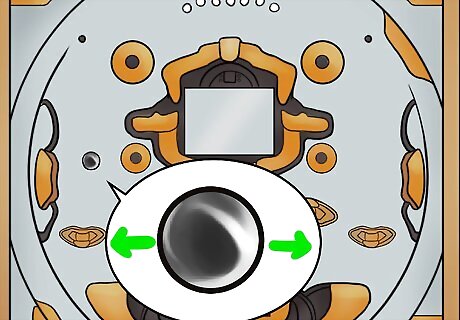
Try to go through the gaps. Part of pachinko is avoiding the pegs on the board, which can make your balls go off course. When turning the wheel, try to get the balls between the gaps as much as possible so they fall easily into the winning hole. You can launch the balls singly. Each board has about 500 pegs that you must guide your balls through.
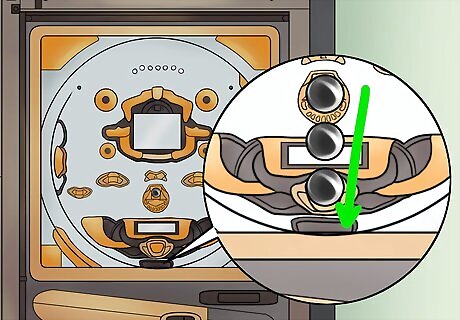
Watch for the doors. Another part of pachinko is the small doors that surround the hole, one one each side. When they are shut, you'll only be able to get one ball through. When they open, you'll be able to get three balls through at once. The balls that go in reward you with more balls, as well as giving you a spin on the slot machine.
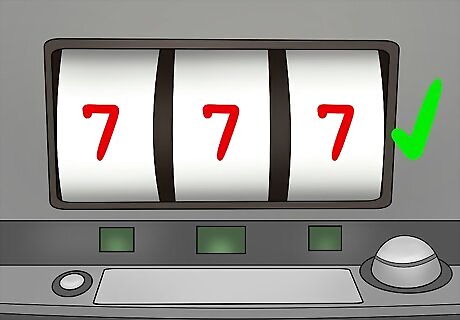
Play the slot machine. The slot machine uses numbers, which you need to line up. You are looking for a three in a row. Of course, you want three in a row, but you also want a situation called a reach, where you are waiting for the third number to show up after having two in a row. You'll see reach happen about a fourth of the time. When it does, you'll have the number you want represented on the screen, battling against another number you don't want. Usually, these numbers are represented by various silly characters that literally battle across the screen. If the other number wins, which usually happens, you lose. However, the fun happens when your number wins in a reach. When it does, each ball you've already won is converted to ten balls, or the machine will pay out a huge amount of balls.
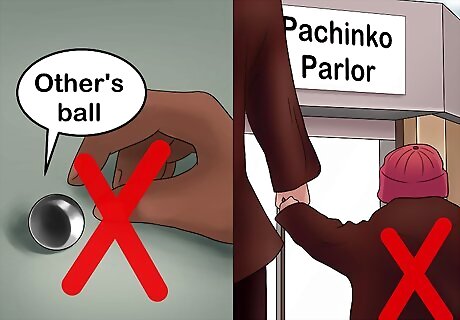
Use pachinko etiquette. Pachinko is a very popular game in Japan, so an entire set of etiquette rules have popped up. It’s best to follow them if you are playing the game in its home country, as you can upset people if you don't. Don't gloat over winnings or look sad when you lose, as you are playing close by other people, and generally, everyone keeps a poker face. Most people don't want to be disturbed by the people around them. They view the game as something they do alone, not together. Make sure not to touch anyone else's balls, as it's considered bad luck and bad form. If you need to reserve a machine, use a pack of cigarettes or some other marker, and place it in the tray, which will work for about half an hour. Don't take children with you.
Getting Your Winnings
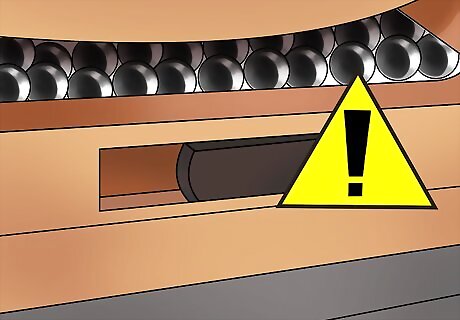
Empty the winnings box. If you hit a jackpot, which is called an aotari, the machine will spit out balls into your lower tray. Once you have a lot or it seems to be overflowing, you need to empty it into your winnings box with the lever at the bottom. Never move the winnings box yourself. If it's full, you need to call a staff member, who will come move it for you. Usually, the person will set it behind you on the floor. You'll also get a new winnings box if you're still playing. Each box of balls is usually worth about 5,000 yen.
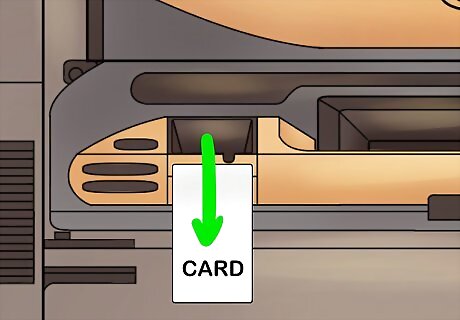
End your game. Once you're done, you need to collect any money you still have on your card, which you can do by pressing the card/coin return button. It should eject your card for you to take with you. Remember, like any gambling game, it's best to quit while you're ahead.
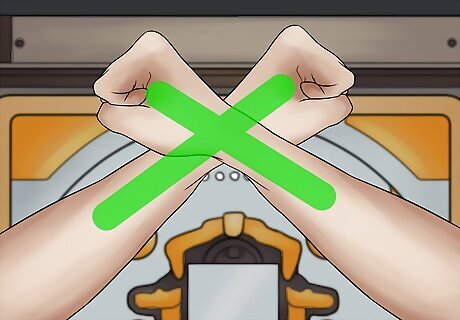
Call the staff. Once again, you never touch the winning boxes of balls, mostly because no one wants to pick up thousands of balls. If you don't have a call button, make a big X with your arms to show the staff you're done. The staff member will come over and pick up your balls for you and take them to the counting machine.
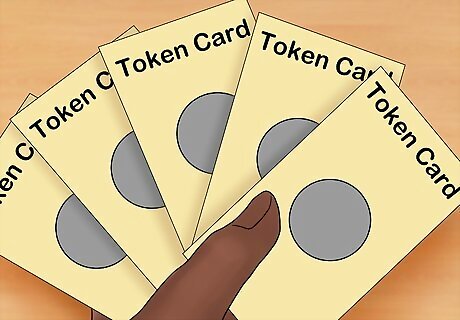
Collect your tokens or cards. Because playing pachinko for money is technically illegal in Japan, you only get tokens or cards at the pachinko parlor. Once your balls are counted, the staff will hand you your tokens. Keep them in a safe place. Just like in casinos, the balls represent a certain amount of money. However, unlike casinos, you have one extra step in the exchange. Think of it like converting money. You are converting balls to tokens to yen.
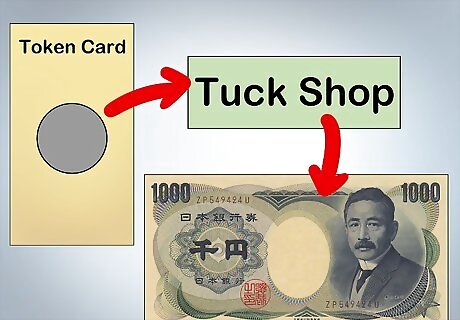
Exchange your tokens at a tuck shop. Once you've gathered your tokens, you must go elsewhere to find a tuck shop, where you can exchange your tokens for yen. Because playing pachinko for money is illegal, the staff at the parlor won't tell you where to look. However, you can ask another friendly pachinko player where to go. Once there, you won't find people to convert your tokens. Rather, you'll find a drawer. You'll be able to pick it out because it usually has Astroturf. You place your tokens in, and the drawer is drawn in. In return, it comes out with your yen, and you leave. Often, the tuck shop is a small shed located near the pachinko parlor. Sometimes, in place of a drawer, you will find hole in the shed’s wall where you retrieve the money.
Finding the Right Machine
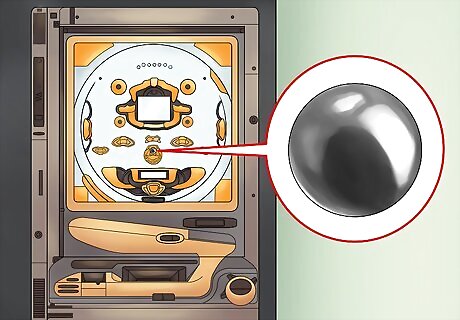
Recognize a pachinko machine. Pachinko has been described as a vertical pinball machine. The goal of the game is to fire balls that fall through a maze of metal pins into a hole. The balls that go through let you play a slot machine with the chance of winning more balls. It's partially a game of skill and partially a game of chance. The small steel balls are smaller than those in most pinball machines. They are shot into a vertical playing field. You'll find three types of Pachinko machines: novice, intermediate, and advanced.
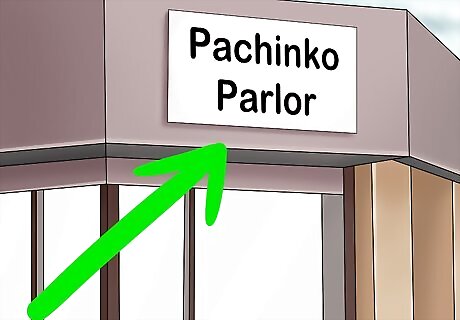
Find a pachinko parlor. In Japan, entire arcades are devoted to pachinko. They are often referred to as pachinko parlors. They are located all throughout Tokyo, as pachinko is a popular game in Japan. At popular parlors, you might even see lines outside some Pachinko parlors in the mornings, as professional pachinko players and others line up early to get in.
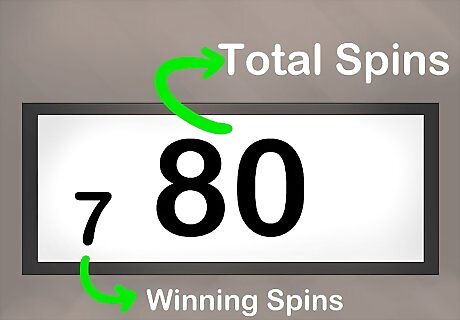
Play to win. On top of every machine, you'll find statistics about how many wins and losses the machine has had. Consult these statistics to help you choose machines, as you want to pick ones with the best odds of winning. On top of the machine, look for a set of numbers. One number will be smaller than the other. That number is how many times the machine has won, while the bigger one is how many spins it has had. Both numbers only represent the day's spins. You want a machine that hasn't that many wins with a large number of spins because machines tend to win in waves. You don’t want a machine that won 25 times yesterday and many times the day before because it probably won’t give you much today. Try not to spend more than 500-1,000 yen ($5 - $10) on any one machine, and don’t play in an empty parlor. It probably has a reputation for losing machines.

Play on new machines. New machines are called "shindai," and you'll see them advertised because they won't have stats on the top of the machine. Nonetheless, they can pay well, especially in the first two weeks. Try to find one to play on, even if you have to reserve a spot for it. You'll often see advertisements on trains for shindai machines in the area.

Play pachinko online. The popularity of pachinko has started to spread around the globe and, to capitalize on this interest, many companies allow you to play pachinko online. You can play on whatever platform you prefer, from a smart phone to a tablet or computer. Finding a site is as simple as searching for "play pachinko online." Some pachinko games online are free. Generally, the free games don't allow you to make any money doing it, but they do allow you to practice how the game works before you try it in real life. You can play pachinko for money online, using your credit card, but always be wary of online gambling. Not only can you lose a lot of money, but it can be harder to vet the credibility of the sites.




















Comments
0 comment